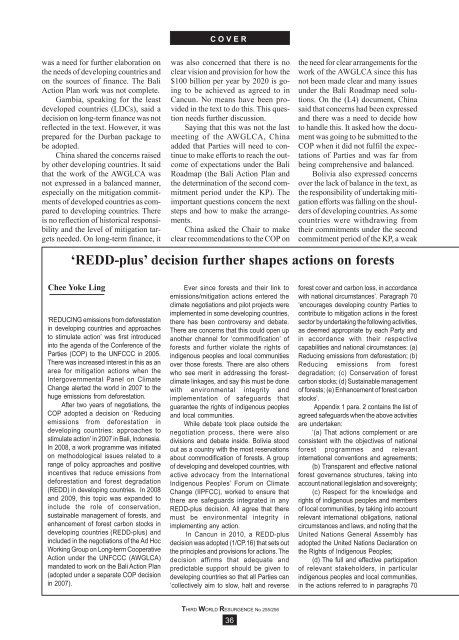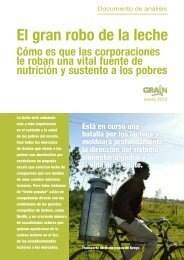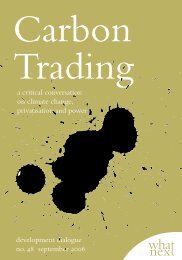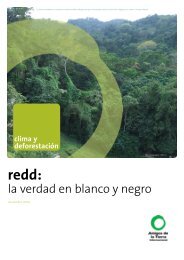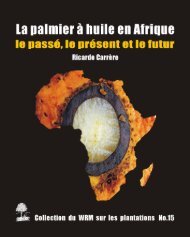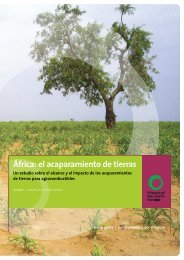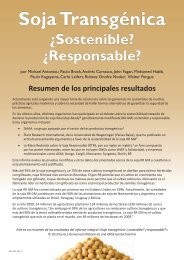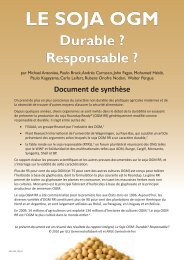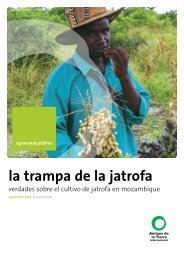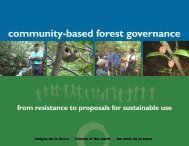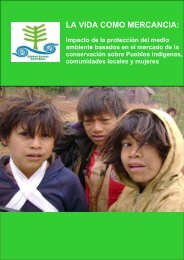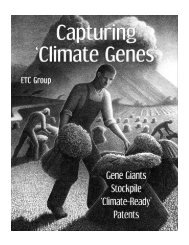Download - Third World Network
Download - Third World Network
Download - Third World Network
You also want an ePaper? Increase the reach of your titles
YUMPU automatically turns print PDFs into web optimized ePapers that Google loves.
C O V E Rwas a need for further elaboration onthe needs of developing countries andon the sources of finance. The BaliAction Plan work was not complete.Gambia, speaking for the leastdeveloped countries (LDCs), said adecision on long-term finance was notreflected in the text. However, it wasprepared for the Durban package tobe adopted.China shared the concerns raisedby other developing countries. It saidthat the work of the AWGLCA wasnot expressed in a balanced manner,especially on the mitigation commitmentsof developed countries as comparedto developing countries. Thereis no reflection of historical responsibilityand the level of mitigation targetsneeded. On long-term finance, itwas also concerned that there is noclear vision and provision for how the$100 billion per year by 2020 is goingto be achieved as agreed to inCancun. No means have been providedin the text to do this. This questionneeds further discussion.Saying that this was not the lastmeeting of the AWGLCA, Chinaadded that Parties will need to continueto make efforts to reach the outcomeof expectations under the BaliRoadmap (the Bali Action Plan andthe determination of the second commitmentperiod under the KP). Theimportant questions concern the nextsteps and how to make the arrangements.China asked the Chair to makeclear recommendations to the COP onthe need for clear arrangements for thework of the AWGLCA since this hasnot been made clear and many issuesunder the Bali Roadmap need solutions.On the (L4) document, Chinasaid that concerns had been expressedand there was a need to decide howto handle this. It asked how the documentwas going to be submitted to theCOP when it did not fulfil the expectationsof Parties and was far frombeing comprehensive and balanced.Bolivia also expressed concernsover the lack of balance in the text, asthe responsibility of undertaking mitigationefforts was falling on the shouldersof developing countries. As somecountries were withdrawing fromtheir commitments under the secondcommitment period of the KP, a weak‘REDD-plus’ decision further shapes actions on forestsChee Yoke Ling‘REDUCING emissions from deforestationin developing countries and approachesto stimulate action’ was first introducedinto the agenda of the Conference of theParties (COP) to the UNFCCC in 2005.There was increased interest in this as anarea for mitigation actions when theIntergovernmental Panel on ClimateChange alerted the world in 2007 to thehuge emissions from deforestation.After two years of negotiations, theCOP adopted a decision on ‘Reducingemissions from deforestation indeveloping countries: approaches tostimulate action’ in 2007 in Bali, Indonesia.In 2008, a work programme was initiatedon methodological issues related to arange of policy approaches and positiveincentives that reduce emissions fromdeforestation and forest degradation(REDD) in developing countries. In 2008and 2009, this topic was expanded toinclude the role of conservation,sustainable management of forests, andenhancement of forest carbon stocks indeveloping countries (REDD-plus) andincluded in the negotiations of the Ad HocWorking Group on Long-term CooperativeAction under the UNFCCC (AWGLCA)mandated to work on the Bali Action Plan(adopted under a separate COP decisionin 2007).Ever since forests and their link toemissions/mitigation actions entered theclimate negotiations and pilot projects wereimplemented in some developing countries,there has been controversy and debate.There are concerns that this could open upanother channel for ‘commodification’ offorests and further violate the rights ofindigenous peoples and local communitiesover those forests. There are also otherswho see merit in addressing the forestclimatelinkages, and say this must be donewith environmental integrity andimplementation of safeguards thatguarantee the rights of indigenous peoplesand local communities.While debate took place outside thenegotiation process, there were alsodivisions and debate inside. Bolivia stoodout as a country with the most reservationsabout commodification of forests. A groupof developing and developed countries, withactive advocacy from the InternationalIndigenous Peoples’ Forum on ClimateChange (IIPFCC), worked to ensure thatthere are safeguards integrated in anyREDD-plus decision. All agree that theremust be environmental integrity inimplementing any action.In Cancun in 2010, a REDD-plusdecision was adopted (1/CP.16) that sets outthe principles and provisions for actions. Thedecision affirms that adequate andpredictable support should be given todeveloping countries so that all Parties can‘collectively aim to slow, halt and reverseforest cover and carbon loss, in accordancewith national circumstances’. Paragraph 70‘encourages developing country Parties tocontribute to mitigation actions in the forestsector by undertaking the following activities,as deemed appropriate by each Party andin accordance with their respectivecapabilities and national circumstances: (a)Reducing emissions from deforestation; (b)Reducing emissions from forestdegradation; (c) Conservation of forestcarbon stocks; (d) Sustainable managementof forests; (e) Enhancement of forest carbonstocks’.Appendix 1 para. 2 contains the list ofagreed safeguards when the above activitiesare undertaken:‘(a) That actions complement or areconsistent with the objectives of nationalforest programmes and relevantinternational conventions and agreements;(b) Transparent and effective nationalforest governance structures, taking intoaccount national legislation and sovereignty;(c) Respect for the knowledge andrights of indigenous peoples and membersof local communities, by taking into accountrelevant international obligations, nationalcircumstances and laws, and noting that theUnited Nations General Assembly hasadopted the United Nations Declaration onthe Rights of Indigenous Peoples;(d) The full and effective participationof relevant stakeholders, in particularindigenous peoples and local communities,in the actions referred to in paragraphs 70THIRD WORLD RESURGENCE No 255/25636


